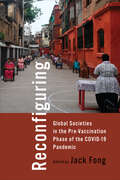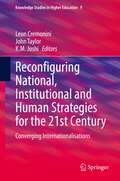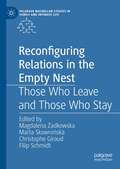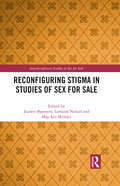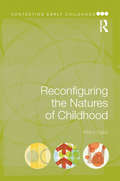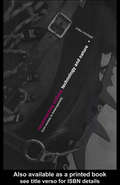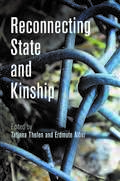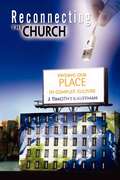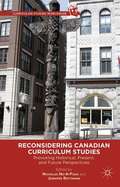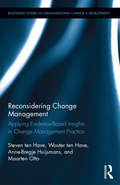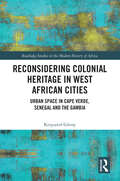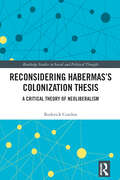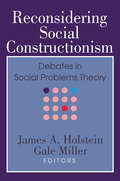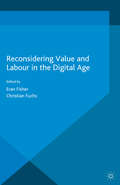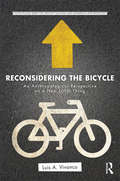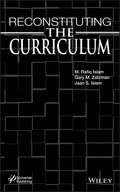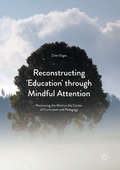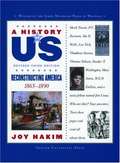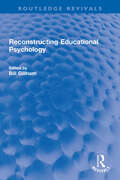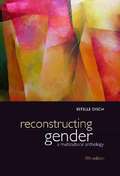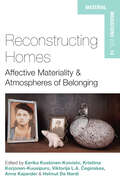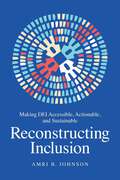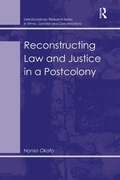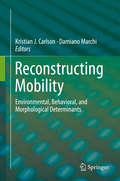- Table View
- List View
Reconfiguring Global Societies in the Pre-Vaccination Phase of the COVID-19 Pandemic
by Jack FongReconfiguring Global Societies in the Pre-Vaccination Phase of the COVID-19 Pandemic examines lived experiences of the COVID-19 pandemic in communities and societies around the world before the arrival of vaccines. This collection presents analyses of scholars from eight countries, all of whom were engaged in the unfolding crisis of social forces across the world. This timely volume conveys valuable insights about how public officials, the state, healthcare workers, and, ultimately, citizens responded to consequences of the pandemic upon not only the body but also social relations in community, city, and society. The contributing scholars document how state apparatuses, urban configurations, places of employment, legal structures, and ways of life responded to crisis-altered social conditions during the pandemic. The book investigates what societies experiencing crisis around the world reveal about the state’s efficacy and inefficacy in fulfilling its social contract for its citizens, especially on unresolved issues related to social relations based on politics, race, ethnicity, gender, and crime. This collection brings together a cross section of scholars experiencing the same temporal moment of crisis together, watching and observing how the pandemic of their age uncoiled itself into the fabric of community, onto the institutions and bureaucracies of society, and into the most intimate confines of the home.
Reconfiguring National, Institutional and Human Strategies for the 21st Century: Converging Internationalizations (Knowledge Studies in Higher Education #9)
by John Taylor K. M. Joshi Leon CremoniniThis book addresses policies and strategies on internationalization across very different higher education systems globally, including inter alia from South America, Asia and Africa. The volume zooms in on the interplay between the national, institutional and “human” levels of internationalization. The latter is especially novel in that it pays particular attention to how internationalization shapes individuals – rather than only to the effects on student learning or research productivity. The work expounds on (a) the role of internationalization in fostering ethical forms of integration and preparing citizens to engage in dialogue across those differences, (b) the possible trade-offs between private benefits and negative social effects, and (c) the contribution of internationalization to a “global community of minds”. By discussing the human dimension, it becomes clear how internationalization can contribute to defining unique ways to confront today’s societal challenges. Moreover, as the world is facing unprecedented challenges in the wake of the coronavirus, a specific chapter examines how the pandemic has made diversity among different student groups more explicit and what implications this holds for the globalisation of higher education. A range of methodologies was adopted, including qualitative (case studies and interviews) and quantitative (e.g. surveys). The book draws on both strategic frameworks and research projects to provide new perspectives on how internationalization plays out, especially linking strategies with human impacts.
Reconfiguring Relations in the Empty Nest: Those Who Leave and Those Who Stay (Palgrave Macmillan Studies in Family and Intimate Life)
by Christophe Giraud Magdalena Żadkowska Marta Skowrońska Filip SchmidtThis edited volume traverses the spectrum of experiences that take place after children leave the family home and parents find themselves in the "empty nest" stage of life. Rather than focusing on measuring the intensity of empty nest syndrome or asking whether parents' marital satisfaction increases or decreases in this phase, the authors present rich qualitative data from across Poland and France to show that there is great variation in how families experience the empty nest, developing both a study on intimacy and love and on family solidarity. Throughout the book, themes of mixed emotions, nuanced attitudes, contradictions, and dissonance are explored while shedding light on "supporting actors" of the empty nest transition, such as family pets and material objects.
Reconfiguring Stigma in Studies of Sex for Sale (Interdisciplinary Studies in Sex for Sale)
by Jeanett BjønnessReconfiguring Stigma in Studies of Sex for Sale is about the production and effects of stigma in sex work or prostitution with contributions from four continents and different disciplines that taken together explore how such stigma is conditioned by differences in time, place, citizenship, gender, sexuality, class and race. Stigma is about relationships between people and also sets an interpretative frame whereby people understand and react to situations and actions, and the book is developed and organized to investigate this from various angles. It presents empirical studies that build on and expand the scholarship on stigma and sex work. This means that it contributes to a more complex understanding of stigma in sex work studies. Further, by using the example of sew work to explore how we can best understand the production and consequences of stigma, the book makes a contribution that is relevant for all scholars who work on stigma and stigmatization. The book is intended for academic audiences interested in sex work or prostitution, on the one hand, and stigmatization, on the other. It is also intended for students in a broad range of disciplines, as well as for practitioners and activists who encounter or work with stigmatization or stigmatized populations.
Reconfiguring the Natures of Childhood (Contesting Early Childhood Ser.)
by Affrica TaylorIn this fascinating new book, Affrica Taylor encourages an exciting paradigmatic shift in the ways in which childhood and nature are conceived and pedagogically deployed, and invites readers to critically reassess the naturalist childhood discourses that are rife within popular culture and early years education.Through adopting a common worlds fram
Reconnecting Culture, Technology and Nature: From Society to Heterogeneity (International Library of Sociology)
by Mike MichaelIn this exciting new book, Mike Michael uses case studies of mundane technologies such as the walking boot, the car and the TV remote control to question some of the fundamental dichotomies through which we make sense of the world. Drawing on the insights of Bruno Latour, Donna Haraway and Michel Serres, the author elaborates an innovative methodology through which new hybrid objects of study are creatively constructed, tracing the ways in which the cultural, the natural and the technological interweave in the production of order and disorder. This book critically engages with and draws connections between a wide range of literature including those concerned with the environment, consumption and the body.
Reconnecting State and Kinship
by Erdmute Alber Tatjana ThelenWithin the social sciences, kinship and statehood are often seen as two distinct modes of social organization, sometimes conceived of as following each other in a temporal line and sometimes as operating on different scales. Kinship is traditionally associated with small-scale communities in stateless societies. The state, meanwhile, is viewed as a development away from kinship as political order toward rational, impersonal, and functional forms of rule. In recent decades, theoretical and empirical scholarship has challenged these notions, but the underlying presumption of a deep-rooted opposition between kinship and the (modern) state has remained surprisingly stable.That this binary is so deeply engrained in Western self-understanding and knowledge production poses a considerable challenge to decoding their coproduction. Reconnecting State and Kinship seeks to trace the historical shifts and boundary work implied in the ongoing reproduction of these supposedly discrete or even opposing units of analysis. Contributors ask whether concepts associated with one sphere —including corruption, patronage, lineage, and incest—surface in the other. Policies and interventions modeled upon the assumed polarity can have lasting consequences for mechanisms of marginalization and exclusion, including decisions about life and death.Reconnecting State and Kinship not only explores the boundary-related and classificatory practices that reinforce the kinship/statehood binary but also tracks the traveling of these concepts and their underlying norms through time and space ultimately demonstrating the ways that kinship and "the state" are intertwined.Contributors: Erdmute Alber, Apostolos Andrikopoulos, Helle Bundgaard, Jeanette Edwards, Karen Fog Olwig, Victoria Goddard, Michael Herzfeld, Eirini Papadaki, Frances Pine, Ivan Rajković, Tatjana Thelen, Thomas Zitelmann.
Reconnecting The Church
by J. Timothy KauffmanReconnecting the Church is offered as a practical guide to assist pastors and laypeople in understanding the city, engaging, and serving the local community in which the church is located. The book’s purpose is to come along side the local church that wishes to reconnect to its local community, and offer practical ways to accomplish that task. There are 25 chapters each of which describes briefly an aspect of life in the city. At the end of each chapter are practical action/reflection projects. These projects are designed to give the reader first-hand experience of their church’s immediate neighborhood. They are specific tasks, most of which will be done outside the church. Each action is described, and guidance is given for reflection after each project.
Reconsidering Canadian Curriculum Studies
by Nicholas Ng-A-Fook Jennifer RottmannComprised of chapters written by established Canadian curriculum scholars as well as junior scholars and graduate students, this collection of essays provoke readers to imagine the different ways in which educational researchers can engage the narrative inquiry within the broader field of curriculum studies.
Reconsidering Change Management: Applying Evidence-Based Insights in Change Management Practice (Routledge Studies in Organizational Change & Development #16)
by Steven ten Have Wouter ten Have Anne-Bregje Huijsmans Maarten OttoDespite the popularity of organizational change management, the question arises whether its prescriptions and dominant beliefs and practices are based on solid and convergent evidence. Organizational change management entails interventions intended to influence the task-related behavior and associated results of an individual, team, or entire organization. There is a perception that a lot of change initiatives fail and limited understanding about what works and what does not and why. Drawing on the field of psychology and based on primary research, Reconsidering Change Management identifies 18 popular and relevant commonly held assumptions with regard to change management that are then analyzed and compared to the four specific themes laid out in the book (people, leadership, organization, and change process), resulting in their own set of assumptions. Each assumption will have a brief introduction in which its relevance and popularity is explained. By studying the scientific evidence, in particular meta-analytic evidence, the book provides students and academics in the fields of change management, organizational behavior, and business strategy the best available evidence for the acceptance or dropping of certain (change) management assumptions and their accompanying practices. By exploring the topics people, leadership, organization, and process, and the related assumptions, change management is restructured and reframed in a prudent, positive, and practical way.
Reconsidering Colonial Heritage in West African Cities: Urban Space in Cape Verde, Senegal and The Gambia (Routledge Studies in the Modern History of Africa)
by Krzysztof GórnyThe material heritage of the colonial era is built into Africa’s cities, from their urban layouts, to their architecture, monuments and street names. This book discusses the varying responses to colonial heritage in West African cities, with a particular focus on the case studies of Praia in Cape Verde, Dakar in Senegal and Banjul in The Gambia. Europeans tended to focus on cities as centres of administration, and they were often both the starting points for settlement and the locations in which power was formally handed over to new African governments. Colonialism in Praia, Dakar and Banjul was abolished at different times, under different colonial powers (Portuguese, French and British) and amongst vastly different conditions of unrest. Based on extensive original research, this book demonstrates that the contemporary approach to the contentious issue of urban colonial heritage is often determined by metropolis-colony relationship before decolonisation, postcolonial diplomatic relations as well as present-day political decisions. The book uncovers a rich relationship between politics and urban space, and between new and old. Combining insights from political sciences, history, critical geography, heritage studies and urban planning, this book will be of interest to a wide range of researchers.
Reconsidering Habermas’s Colonization Thesis: A Critical Theory of Neoliberalism (Routledge Studies in Social and Political Thought)
by Roderick CondonThis book reconsiders Habermas’s critique of capitalism as a foundation for a critical theory of neoliberalism. Taking criticisms into account, the author refines and redevelops Habermas’s system-lifeworld paradigm in three parts, focusing on system, lifeworld, and communication. The exposition unfolds through a new synthesis and convergence, from within Habermas’s frame, of Axel Honneth, Niklas Luhmann, Talcott Parsons, and Karl Marx. This synthesis is interwoven with an account of the neoliberal turn, such that social theory is historically contextualized and neoliberalism theoretically explained at one and the same time. The end result is a reconstruction of the colonization thesis in a new theory of relinguistification, advancing a communicative, dialectical, and reflexive theory of reification.Reconsidering Habermas’s Colonization Thesis will appeal to scholars of critical theory, social theory, sociology, and cultural studies, as well as readers interested in neoliberalism and the critique of capitalism.
Reconsidering Social Constructionism: Social Problems and Social Issues (Social Problems And Social Issues Ser.)
by Gale MillerWith the impact of social interactionist and ethnographic methodology twenty-five years ago, the research agenda in social problems began to shift its focus, giving rise to the Social Constructionism movement. The present volume and the related shorter text, Constructionist Controversies, review the substantial contributions made by social constructionist theorists over that period, as well as recent debates about the future of the perspective. These contributions redefine the purpose and central questions of social problems theory and articulate a research program for analyzing social problems as social constructions. A generation of theorists has been trained in the constructionist perspective and has extended it through numerous analyses of diverse aspects of contemporary social life.The debates in this volume pose fundamental questions about the major assumptions of the perspective, the ways in which it is practiced, and the purposes of social problems theory. Their point of departure is Ibarra and Kitsuse's essay, cutting new theoretical ground in calling for ""investigating vernacular resources, especially rhetorical forms, in the social problems process.""Contributors are forceful proponents both within and outside of the social constructionist community, who take a broad array of positions on the current state of social problems theory and on the rhetorical forms that need exploring. They also lay down the general lines for diverse and often competing programs for the future development of the constructionist agenda.
Reconsidering Value and Labour in the Digital Age (Dynamics Of Virtual Work)
by Christian Fuchs Eran FisherThis volume explores current interventions into the digital labour theory of value, proposing theoretical and empirical work that contributes to our understanding of Marx's labour theory of value, proposes how labour and value are transformed under conditions of virtuality, and employ the theory in order to shed light on specific practices.
Reconsidering Value and Labour in the Digital Age (Dynamics of Virtual Work)
by Christian Fuchs Eran FisherThis volume explores current interventions into the digital labour theory of value, proposing theoretical and empirical work that contributes to our understanding of Marx's labour theory of value, proposes how labour and value are transformed under conditions of virtuality, and employ the theory in order to shed light on specific practices.
Reconsidering the Bicycle: An Anthropological Perspective on a New (Old) Thing (Routledge Series for Creative Teaching and Learning in Anthropology)
by Luis A. VivancoIn cities throughout the world, bicycles have gained a high profile in recent years, with politicians and activists promoting initiatives like bike lanes, bikeways, bike share programs, and other social programs to get more people on bicycles. Bicycles in the city are, some would say, the wave of the future for car-choked, financially-strapped, obese, and sustainability-sensitive urban areas. This book explores how and why people are reconsidering the bicycle, no longer thinking of it simply as a toy or exercise machine, but as a potential solution to a number of contemporary problems. It focuses in particular on what reconsidering the bicycle might mean for everyday practices and politics of urban mobility, a concept that refers to the intertwined physical, technological, social, and experiential dimensions of human movement. This book is for Introductory Anthropology, Cultural Anthropology, Cultural Sociology, Environmental Anthropology, and all undergraduate courses on the environment and on sustainability throughout the social sciences.
Reconstituting the Curriculum
by Gary M. Zatzman Jaan S. Islam M. R. IslamThis inspiring work presents a truly knowledge-based approach to education as an alternative to the current curriculum that is based on consolidating pre-conceived ideas. It demonstrates the advantages of the new curriculum, both in terms of acquiring knowledge and preventing current problems such as technological disasters, global injustice, and environmental destruction. It also shows how it can eliminate plagiarism, low retention in classrooms, non-representative grading, and other common problems. Examples are given from various disciplines, ranging from science and engineering to philosophy and law.
Reconstructing 'Education' through Mindful Attention
by Oren ErgasThis book reconstructs the idea and practice of education. Rather than conceiving of education as a process we undergo in which our minds are shaped by a social vision, Oren Ergas turns this notion of education on its head, arguing instead that we ourselves construct education. The multitude of problems with formal education and schooling, such as violence, inequality, and low achievements, are then seen as reflections of problems of the mind, meaning that close study of the mind is necessary if these problems are to be successfully tackled. Through philosophy, neuroscience and psychology, this book proposes a new perspective on 'educational' theory, practice and research. It will be of great interest to students and teachers, scholars of education, and educational policy-makers.
Reconstructing America: 1865-1890 (A History of Us #7)
by Joy HakimCovering a time of great hope and incredible change, Reconstruction and Reform is a dramatic look at life after the Civil War in the newly re-United States. Railroad tycoons were roaring across the country. New cities sprang up across the plains, and a new and different American West came into being: a land of farmers, ranchers, miners, and city dwellers. Back East, large scale immigration was also going on, but not all Americans wanted newcomers in the country. Technology moved forward: Thomas Edison lit up the world with his electric light. And social justice was on everyone's mind with Carry Nation wielding a hatchet in her battle against drunkenness and Booker T. Washington and W. E. B. DuBois counseling newly freed African Americans to behave in very different ways. Through it all, the reunited nation struggles to keep the promises of freedom in this exciting chapter in the A History of US. This text is listed as an example that meets Common Core Standards in English language arts in grades 4-5 at http://www.corestandards.org.]
Reconstructing Educational Psychology (Routledge Revivals)
by Bill GillhamFirst published in 1978, Reconstructing Educational Psychology presents a new look at topics of central social concern such as children’s rights, the community approach to children’s problems, the inutility of traditional concepts of intelligence and personality, the interactionist approach to the concept of ‘deviant’ behaviour and the invalidity of psychiatric concepts of ‘maladjustment’. New ideas are the core of the book. It begins with historical and personal accounts of the origin and the nature of the situation of educational psychology. It spells out the way in which new thinking determines new practice, and the extent to which progress has been made. The book will be of interest to teachers, psychologists as well as to students of pedagogy and psychology.
Reconstructing Gender: A Multicultural Anthology
by Estelle DischReconstructing Gender is an anthology that addresses the contemporary experiences from a variety of women and men. Drawing from a wide range of sources including research articles, critical essays, and personal narratives, Disch has chosen accessible, engaging, and provocative readings that represent many perspectives and experiences. Eleven part-opening introductions identify important issues in the general field of study, describe the readings, remind the reader about some of the central themes emerging throughout the book, and raise questions for students to consider.
Reconstructing Homes: Affective Materiality and Atmospheres of Belonging (Material Mediations: People and Things in a World of Movement #15)
by Eerika Koskinen-Koivisto, Kristiina Korjonen-Kuusipuro, Viktorija L.A. Čeginskas, Anna Kajander Helmut De NardiIn the practice of constructing the idea of home and the emotions surrounding it, sensory experiences and materiality intertwine to form layers of memory and affective atmospheres. People in different life stages and situations create continuity and a sense of home by engaging with materiality and objects in their own unique way. Reconstructing Homes takes on a multidisciplinary approach of sensory ethnography, visual methods and autoethnography methodologies to explore affective engagements with materiality in the context of home and the idea of belonging.
Reconstructing Inclusion: Making DEI Accessible, Actionable, and Sustainable
by Amri B. JohnsonOrganizational appetites for diversity, equity, and inclusion (DE&I) have never been more acute. But how can these new efforts, which often call on old strategies, now result in better outcomes? This book deconstructs and rebuilds the fundamental concepts of inclusion to reclaim their transformative potential for DE&I practitioners and the organizations they work with. Organizations of all types are making unprecedented investments in unconscious bias training, diversity recruitment, and anti-racism education. Words like belonging and equity are on the list of aspirational outcomes for these efforts, but the pathways to those goals are unclear because their implementation has been reactionary, supplemental, and in too many instances cosmetic rather than systemic. In Reconstructing Inclusion, Amri Johnson, CEO of Inclusion Wins, explores why that reactionary stance persists and provides a framework for designing a systematic approach that empowers all stakeholders in these efforts—everyone—to thrive. In deconstructing and rebuilding inclusion&’s most fundamental concepts, Johnson illustrates an &“Inclusion System&” that outlines the conditions critical to inclusion becoming normative—accessible, actionable, sustainable, and positively contributing to the organizational mission. Reconstructing Inclusion offers a guide to better understanding the historical context of inclusion, a rethinking of the efforts organizations are undertaking now, and an actionable, robust approach to carrying this work into the future.
Reconstructing Law and Justice in a Postcolony
by Nonso OkafoDrawing on data from a cross-section of postcolonial nations across the world and on a detailed case-study of Nigeria, this book examines the experience of recreating law and justice in postcolonial societies. The author's definition of postcolonial societies includes countries that have emerged from external colonial rule, such as Nigeria and India as well as societies that have overcome internal dominations, such as Afghanistan and Iraq. Suggesting that restructuring a system of law and justice must involve a consideration of the traditions, customs and native laws of a society as well as the official, often foreign rules, this volume examines how ethnically complex nations resolve disputes, whether criminal or civil, through a combination of formal and informal social control systems. This book is unique in its concern with how the average citizens of a postcolonial society can play more active parts in their nation's law and justice, and how modern and increasingly urban societies can learn from indigenous peoples and institutions, which are more informal in their approaches to problem-solving. The concluding chapter looks at the possibility of an increased role for civil as opposed to criminal response in the social control system of a postcolonial society.
Reconstructing Mobility
by Kristian J. Carlson Damiano MarchiAssembles a collection of experts to provide a current account of different approaches (e. g. , traditional, comparative and experimental) being applied to study mobility. Moreover, the book aims to stimulate new theoretical perspectives that adopt a holistic view of the interaction among intrinsic (i. e. skeletal) and extrinsic (i. e. environmental) factors that influence differential expression of mobility. Since the environment undoubtedly impacts mobility of a wide variety of animals, insights into human mobility, as a concept, can be improved by extending approaches to investigating comparable environmental influences on mobility in animals in general. The book teases apart environmental effects that transcend typical categories (e. g. , coastal versus inland, mountainous versus level, arboreal versus terrestrial). Such an approach, when coupled with a new emphasis on mobility as types of activities rather than activity levels, offers a fresh, insightful perspective on mobility and how it might affect the musculoskeletal system.
